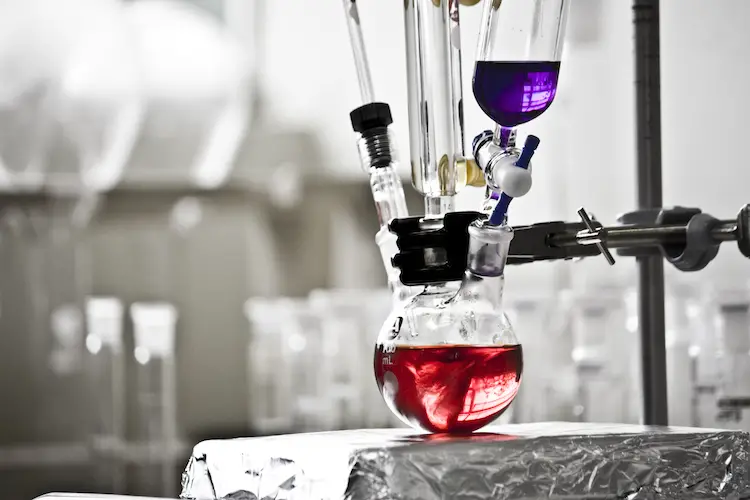Organic synthesis is a branch of chemistry that focuses on the construction of complex organic molecules from simpler starting materials. In an advanced organic synthesis experimental course, students learn how to design and carry out experiments to synthesize a wide range of organic compounds.
One of the key skills that students develop in an advanced organic synthesis course is the ability to plan and execute synthetic routes. This involves identifying the starting materials, choosing appropriate reaction conditions and reagents, and predicting the products of the reaction. Students learn how to use a variety of techniques, such as purification and characterization methods, to confirm the identity and purity of the synthesized compounds.
In addition to learning how to plan and execute synthetic routes, students in an advanced organic synthesis course also learn about the latest developments and techniques in the field. This may include topics such as green chemistry, asymmetric synthesis, and enzymatic catalysis. Students may also have the opportunity to work on research projects and gain hands-on experience with state-of-the-art instrumentation and techniques.
Overall, an advanced organic synthesis experimental course provides students with a solid foundation in the principles and practices of organic synthesis. This knowledge and experience can be applied in a variety of fields, including pharmaceuticals, materials science, and biotechnology. Students who complete an advanced organic synthesis course will be well-prepared to pursue careers in research and development, or to continue their studies at the graduate level.
Below are several experiments of greater complexity than in the Organic Synthesis Lab Experiments section. that can be developed in a practical advanced Organic Synthesis course.

Image taken by Angel Sánchez
The origin of this greater complexity may be due to several reasons, such as: the reactions that are performed have more complicated reaction mechanisms, the procedures required to develop the syntheses are more sophisticated and, therefore, require the student to have passed a basic training in an Organic Chemistry laboratory (Organic Synthesis), the nature of starting products and/or reagents requires a very careful handling, or the initial and/or final products are not contemplated in the contents of an elementary course of Organic Chemistry.
Multi-step processes have a greater presence than in the Organic Synthesis Lab Experiments section.
In addition, several C-C bond formation procedures are also described, among others, through Wittig, Diels-Alder reactions or by using organometallic reagents, and the preparation and chemical modification of some heterocycles and natural products are studied.
In some cases, this type of reactions requires the use of special conditions such as inert atmosphere, gradual addition of reagents and/or the use of anhydrous solvents, which adds to the difficulty of these reactions.
The experiments of an advanced Organic Synthesis course can be carried out from the following list:
Miniscale Experiments
- Obtaining benzotriazole
- Ethyl acetoacetate synthesis
- Diels-Alder reaction between butadiene and maleic anhydride
- Synthesis of isopropylidene-D-glucofuranose
- Wittig reaction for obtaining 4-vinylbenzoic acid
- Synthesis of triphenylmethanol (triphenylcarbinol)
- Synthesis of 2-acetylcyclohexanone
- Synthesis of 2-aminobenzoic acid (anthranilic acid)
- Stereospecific synthesis of trans-1,2-cyclohexanediol
- Synthesis of 7-hydroxy-4-methyl-coumarin
- Multistep synthesis of a uridine-derivative nucleoside
- Synthesis of triphenylpyridine
- Isolation of limonene from citrus peel
- Preparation of 1-bromobutane
- Benzocaine synthesis
- (±)-α-Methylbenzylamine production
- Synthesis of n-butylbarbituric acid
- Benzoin synthesis and reactions
- Synthesis of 1,3-diphenyl-2-propen-1-one (chalcone)
- Synthesis of 2-allylphenol
- Synthesis of biphenyl derivative (4-phenylphenol) by Suzuki reaction
- Preparation of pyrrolidine enamine and acetylation from cyclohexanone
- Synthesis of (±)‐4‐methylheptan‐3‐ol and (±)‐4‐methylheptan‐3‐one (insect pheromones)
- Synthesis of 6‐nitrosaccharin (sweetener)
- Reduction of 4‐t‐butylcyclohexanone with sodium borohydride (NaBH4)
- Conversion of 1-bromobutane into 1-iodobutane via SN2 mechanism (Finkelstein reaction)
- Preparation of methyl diantilis from ethylvanillin using solid-phase peptide synthesis (SPPS) techniques
Microscale Experiments
References
- Isac-García, J.; Dobado, J. A.; Calvo-Flores, F. G.; and Martínez-García, H. (2015). Experimental Organic Chemistry Laboratory Manual. Elsevier Science & Technology. ISBN: 978-0-12-803893-2